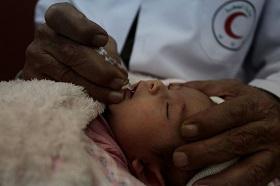Using AI to control energy for indoor agriculture
30 September 2024
Published online 15 April 2014

The baby, from Rusafa in northern Baghdad, developed paralysis on 10 February. Genetic sequencing indicates the virus with which he was infected was most closely related to the original one in Syria.
A polio vaccination campaign began in Iraq on 6 April,– the first nationwide campaign since the Ministry of Health confirmed the Rusafa case – the seventh such campaign launched in Iraq since the polio outbreak in Syria five months ago. The WHO estimated that in 2012, routine polio immunisation rates in Iraq were at 70%.
"The recent detection of a polio case in Iraq after a 14-year absence is a reminder of the risk currently facing children throughout the region," says Maria Calivis, UNICEF regional director for the Middle East and North Africa. "It is now even more imperative to boost routine immunisations to reach every child multiple times and do whatever we can to vaccinate children we could not reach in previous rounds," she adds.
Oliver Rosenbauer, a spokesman for the WHO, echoed Calivis's concerns. "Polio can travel great distances and re-infect in areas that are polio-free. Iraq has been conducting immunisation campaigns of pretty good quality yet this virus managed to find the unimmunized."
There were also recent concerns that a child in Lebanon had contracted the virus after it tested positive for acute flaccid paralysis (AFP). Although the child tested negative for polio, the country still remains at risk of re-infection, says Rosenbauer.
Since October last year, 25 polio vaccination campaigns have been completed in the region as part of the largest programme in the Middle East's history. UNICEF said that the numbers of children being vaccinated in each round was rising.
Health organisations were still missing children fleeing the violence in Syria or those living under siege or in areas of heavy conflict, warns Juliette Touma UNICEF's regional spokesperson. "Access to children not reached is a must. This is the only way to defeat polio," Touma says.
Annie Sparrow, a US-based paediatrician and polio specialist, described the outbreak as "the most challenging" in the history of polio eradication. Sparrow said that for every confirmed victim, there are at least 200 people or possibly up to 1000 carrying and spreading the virus. The WHO has so far confirmed 37 cases of polio in Syria alone.
doi:10.1038/nmiddleeast.2014.92
Stay connected: